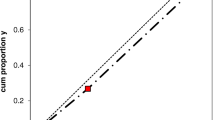Abstract
Objectives
This study was conducted to examine the psychometric properties of the French versions of the Perceived Stress Scale (PSS) and to compare the appropriateness of the three versions of this scale (14 items, 10 items, or 4 items) in a sample of workers.
Materials and Methods
Five hundred and one workers were randomly selected in several occupational health care centers of the North of France during 2010. Participants completed a questionnaire including demographic variables and the PSS. The psychometric properties of this scale were analyzed: internal consistency, factorial structure, and discriminative sensibility.
Results
For the PSS-14 and PSS-10, the Exploratory Factor Analysis (EFA) provided a two-factor structure, corresponding to the positively and negatively worded items. Those two factors were significantly correlated (r = 0.43 and 0.50, respectively). For the PSS-4, the EFA yielded a one-factor structure. The reliability was high for all three versions of the PSS (Cronbach’s α values ranged from 0.73 to 0.84). The results concerning the effects of age, gender, marital, parental and occupational statuses showed that the 10-item version had the best discriminative sensibility.
Conclusions
The findings confirmed satisfactory psychometric properties of all the three French versions of the PSS. We recommend the use of the PSS-10 in research settings because of its good psychometric properties.
Similar content being viewed by others
References
Cohen S, Kamarck T, Mermelstein R. A Global Measure of Perceived Stress. J Health Soc Behav 1983;24(4):385–396.
Lazarus RA. Stress, appraisal, and coping. New York: Springer Publishing Company; 1984.
Cohen S, Spacapan S, Oskamp S. Perceived stress in a probability sample of the United States. The social psychology of health. Thousand Oaks, CA US: Sage Publications Inc.; 1988. p. 31–67.
Remor E. Psychometric properties of a European Spanish version of the perceived stress scale (PSS). Span J Psychol 2006;9(1):86–93.
Ramirez MTG, Hernandez RL. Factor structure of the Perceived Stress Scale (PSS) in a sample from Mexico. Span J Psychol 2007;10(1):199–206.
Mimura C, Griffiths P. A Japanese version of the Perceived Stress Scale: translation and preliminary test. Int J Nurs Stud 2004;41:379–385.
Leung D, Lam T, S C. Three versions of Perceived Stress Scale: validation in a sample of Chinese cardiac patients who smoke. BMC Public Health 2010;10:513.
Wongpakaran N, Wongpakaran T. The Thai version off the PSS-10: An investigation of its psychometrics properties. Biopsychosoc Med 2010;12:4–6.
Orucu M, Demir A. Psychometric evaluation of perceived stress scale for Turkish University student. Stress Health 2008;25:103–109.
Chaaya M, Osman H, Naassan G, Mahfoud Z. Validation of the Arabic version of the Cohen perceived stress scale (PSS-10) among pregnant and postpartum women. BMC Psychiatry 2010;10:111.
Shamsi U, Hatcher J, Shamsi A, Zuberi N, Qadri Z, Saleem S. A multicentre matched case control study of risk factors for preeclampsia in healthy women in Pakistan. BMC Women’s Health 2010;10:14.
Malinauskas R, Malinauskiene V, Dumciene A. Burnout and perceived stress among university coaches in Lithuania. J Occup Health 2010;52(5):302–307.
Dr Cohen’s scales. [cited 2012 March 28]. Available from URL: http://www.psy.cmu.edu/~scohen/scales.html
Bellinghausen L, Collange J, Botella M, Emery J, Albert E. Factorial validation of the French scale for perceived stress in the workplace. Sante Publique (Bucur) 2009;21(4):365–373.
Bruchon-Schweitzer M. Psychologie de la santé. Modèles, concepts et méthodes. Paris: Dunod; 2002.
Peterson RA. Meta-analysis of variance accounted for and factor loadings in exploratory factor analysis. Mark Lett 2000;11:261–275.
Nunnally J, Bernstein IH. Psychometric theory. New York: McGraw-Hill; 1994.
Mitchell AM, Crane PA, Kim Y. Perceived stress in survivors of suicide: Psychometrics properties of the Perceived Stress Scale. Res Nurs Health 2008;31:576–585.
Niezborala M, Marquie JC, Baracat B, Esquirol Y, Soulat J. Job stress and occupational status in a French cohort. Rev Epidemiol Sante Publique 2003;51(6):607–616.
Author information
Authors and Affiliations
Corresponding author
About this article
Cite this article
Lesage, FX., Berjot, S. & Deschamps, F. Psychometric properties of the French versions of the Perceived Stress Scale. IJOMEH 25, 178–184 (2012). https://doi.org/10.2478/S13382-012-0024-8
Received:
Accepted:
Published:
Issue Date:
DOI: https://doi.org/10.2478/S13382-012-0024-8



